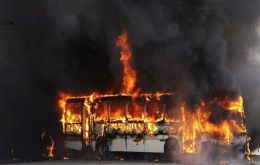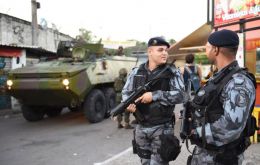MercoPress. South Atlantic News Agency
Tag: Rio do Janeiro
-
Thursday, January 22nd 2015 - 06:09 UTC
Right to sunbathe topless triggers spontaneous protest in Rio beaches
A scantily clad group of female protesters drew a heavily breathing gaggle of journalists and cell-phone wielding onlookers to the beaches of Rio de Janeiro. The protest was not meant to draw attention to another corruption scandal, police killing, or unwanted hike in transit fares, rather demand women’s right to sunbathe topless, a cause that most of the onlookers appeared to support.
-
Wednesday, December 17th 2014 - 02:52 UTC
RIO GAMES 2016 Mascots named after girl from Ipanema Musicians

“Vinicius” De Moraes and Antonio Carlos “Tom” Jobim extend bossa nova influence to Olympìc and Paralympic Games symbols respectively.
-
Tuesday, December 16th 2014 - 22:35 UTC
Antibiotic-proof bug detected in Rio's Olympic waters

Scientists at the Instituto Oswaldo Cruz find enzyme-producing bacteria that requires bolder therapeutic measures. Flamengo beach unfit for swimming.
-
Friday, May 9th 2014 - 07:35 UTC
Chaos in Sao Paulo and Rio, as protestors take to the streets 35 days ahead of the Cup

Two of Brazil's major cities which will be hosting matches of the World Cup in 35 days time, were in chaos on Thursday because of protests from the Landless Peasants and Homeless Workers in Sao Paulo and a bus drivers' strike in Rio do Janeiro.
-
Monday, April 21st 2014 - 07:38 UTC
Killings and riots in Rio do Janeiro; Army patrolled Bahía can't control crime

Hooded youngsters blocked one of Rio do Janeiro's main highways connecting with neighboring Niteroi and set on fire several buses and vehicles to protest the killing of two youths during weekend police operations in the shanty town (favela) of Caramujo. To the north in Salvador-Bahía, Brazilian army patrolling is unable to control crime.
-
Friday, April 11th 2014 - 12:12 UTC
Footage of live mugging of a woman while being interviewed in Rio do Janeiro

Brazilian TV is showing footage of a woman being robbed while being interviewed on television about crime near Rio de Janeiro’s main train station. The images of the interview conducted Wednesday by TV Globo were posted on its G1 internet news portal and come just a few weeks before the beginning of the World Cup.
-
Monday, April 7th 2014 - 06:05 UTC
Army occupies favela in Rio because police was unable to retain control

With only 68 days to the World Cup some 2,700 Brazilian troops seized control Saturday of the Mare favela, shantytowns complex, which is considered Rio de Janeiro's last major drug-gang stronghold and located in a strategic area for security reasons: a through area for the city's airport and the Maracaná stadium.
-
Monday, April 7th 2014 - 05:58 UTC
Scottish oil worker killed during a carjacking incident in Rio do Janeiro

The feeling of insecurity in Brazil's main cities peaked again last week when it was reported that a British oil worker had been shot dead by two men in Rio de Janeiro, a Scottish newspaper reported Saturday.
-
Tuesday, March 25th 2014 - 08:59 UTC
Brazil militarizes favelas in Rio do Janeiro to guarantee 'law and order'

The Brazilian government announced on Monday, 80 days before the start of the 2014 World Cup, that the military will help occupy several “favelas,” or shantytowns, in Rio de Janeiro to guarantee security in an area currently controlled by violent drug trafficking outfits where some 100,000 people live.
-
Sunday, March 23rd 2014 - 09:43 UTC
Federal troops to Rio do Janeiro to try and contain attacks against the police

The government in Brazil says it will send federal troops to Rio de Janeiro to help deal with a spate of violent attacks targeting the city's police. The decision came after the governor of Rio de Janeiro state, Sergio Cabral, asked President Dilma Rousseff for government support ahead of the football World Cup in June.
